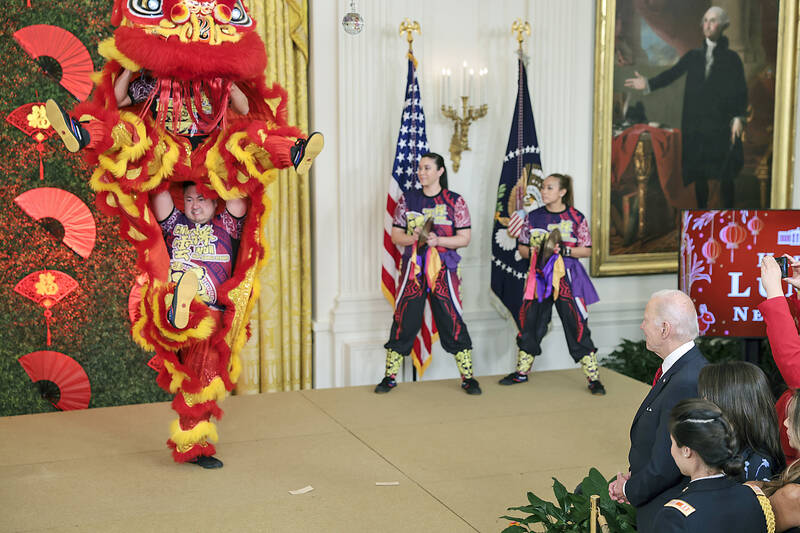US President Joe Biden on Thursday signed off on a two-year extension of a program that protects Hong Kong residents in the US from deportation, renewing the protection until January 2025.
Biden first authorized the program, the Deferred Enforced Departure for Certain Hong Kong Citizens, in August 2021 for 18 months. It was set to expire on Sunday next week.
The decision to provide a temporary safe haven was in response to Hong Kong’s sweeping National Security Law and other measures imposed by Beijing that undercut the rights promised when the former British colony was handed back to China in 1997.

Photo: EPA-EFE
“With this action, we are demonstrating again President Biden’s strong support for the people of Hong Kong in the face of increasing repression,” the White House National Security Council said in a statement. “We continue to strongly oppose the PRC’s [People’s Republic of China] use of its National Security Law to deny the people of Hong Kong their human rights and fundamental freedoms, undermine Hong Kong’s autonomy, and chip away at Hong Kong’s remaining democratic processes and institutions.”
The Chinese government moved to stifle opposition following protests in Hong Kong in 2019 against a proposed law allowing extraditions to mainland China. Under the National Security Law, which took effect in June 2020, police have cracked down on opposition politicians, rights advocates and demonstrators.
Changes were also made to Hong Kong’s election laws to reduce the number of directly elected lawmakers and give a largely pro-Beijing committee the leeway to nominate lawmakers aligned with the Chinese government.
Liu Pengyu (劉鵬宇), spokesman for China’s embassy in Washington, said in a statement that the Biden administration’s decision further exposed the US’ “sinister intention” to undermine stability in Hong Kong and “contain China’s development.”
“We urge the US to stop interfering in Hong Kong affairs,” he said.
Since China imposed the National Security Law, at least 150 opposition politicians, rights advocates and protesters have been taken into custody on politically motivated charges, including secession, subversion, terrorist activities and collusion with a foreign country or external elements, the White House said.
Additionally, 1,200 political prisoners are behind bars, and more than 10,000 people have been arrested on other charges in connection with protests against the Hong Kong government, it said.
In addition to criticizing Beijing’s crackdown on democracy advocates in Hong Kong, Biden has repeatedly taken China to task for military provocations against Taiwan, human rights abuses against Uighurs and other ethnic minorities, coercive trade practices and differences over Russia’s prosecution of its war against Ukraine.

Tropical Storm Gaemi strengthened into a typhoon at 2pm yesterday, and could make landfall in Yilan County tomorrow, the Central Weather Administration (CWA) said yesterday. The agency was scheduled to issue a sea warning at 11:30pm yesterday, and could issue a land warning later today. Gaemi was moving north-northwest at 4kph, carrying maximum sustained winds near its center of up to 118.8kph and gusts of 154.8kph. The circumference is forecast to reach eastern Taiwan tomorrow morning, with the center making landfall in Yilan County later that night before departing from the north coast, CWA weather forecaster Kuan Shin-ping (官欣平) said yesterday. Uncertainty remains and

SEA WARNING LIKELY: The storm, named Gaemi, could become a moderate typhoon on Wednesday or Thursday, with the Taipei City Government preparing for flooding A tropical depression east of the Philippines developed into a tropical storm named Gaemi at 2pm yesterday, and was moving toward eastern Taiwan, the Central Weather Administration (CWA) said. Gaemi could begin to affect Taiwan proper on Tuesday, lasting until Friday, and could develop into a moderate typhoon on Wednesday or Thursday, it said. A sea warning for Gaemi could be issued as early as Tuesday morning, it added. Gaemi, the third tropical storm in the Pacific Ocean this typhoon season, is projected to begin moving northwest today, and be closest to Taiwan on Wednesday or Thursday, the agency said. Today, there would likely

DISRUPTIONS: The high-speed rail is to operate as normal, while several airlines either canceled flights or announced early departures or late arrivals Schools and offices in 15 cities and counties are to be closed today due to Typhoon Gaemi, local governments announced last night. The 15 are: Taipei, New Taipei City, Taoyuan, Tainan, Keelung, Hsinchu and Kaohsiung, as well as Yilan, Hualien, Hsinchu, Miaoli, Chiayi, Pingtung, Penghu and Lienchiang counties. People should brace for torrential rainfall brought by the storm, with its center forecast to make landfall on the east coast between tonight and tomorrow morning, the Central Weather Administration (CWA) said. The agency issued a sea warning for the typhoon at 11:30pm on Monday, followed by a land warning at 11:30am yesterday. As of

CASUALTY: A 70-year-old woman was killed by a falling tree in Kaohsiung as the premier warned all government agencies to remain on high alert for the next 24 hours Schools and offices nationwide are to be closed for a second day today as Typhoon Gaemi crosses over the nation, bringing torrential rain and whipping winds. Gaemi was forecast to make landfall late last night. From Tuesday night, its outer band brought substantial rainfall and strong winds to the nation. As of 6:15pm last night, the typhoon’s center was 20km southeast of Hualien County, Central Weather Administration (CWA) data showed. It was moving at 19kph and had a radius of 250km. As of 3pm yesterday, one woman had died, while 58 people were injured, the Central Emergency Operation Center said. The 70-year-old